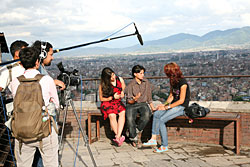 MIN RATNA BAJRACHARYA |
But in a landmark decision in December 2007 the Supreme Court ordered the government to scrap any discriminatory laws against the LGBTI (Lesbian, Gay, Bisexual, Transexual and Intersex) community. Provisions are to be made to recognise them in government documents and third gender status was to be granted in citizenship certificates.
As the news of this decision spread, more closet homosexual and transgender people started coming out all over Nepal. Support groups started in Chitwan, Birganj, Itahari, Nepalganj and Kathmandu. Political parties put the
rights of third genders in their election manifestos while campaigning for the CA election last year.
Gay rights activist Sunil Pant represents the community in the constituent assembly.
Almost two years since the decision, only one person has so far been issued a citizenship certificate that recognises third gender status.
Individuals from the community say that transmen and transwomen are turned back by the district administration saying they haven't received word from the authorities to grant citizenship under the third gender status. It may be much safer to come out as a LGBTI individual today than before, but discrimination still persists and many
feel they live in a state that cannot protect their community.
A year later, in November 2008, when the apex court directed the government to form laws that guarantee equal rights to homosexuals, including the right to marry.
Since the end of the armed conflict Nepal's transition from war is being closely watched by the international community and the foreign press. Lately, Nepal has been making headlines with absurd stories such as airport officials wearing pants without pockets, locals in rural Nepal marrying a pair of frogs for rain and electrocuted crows causing power outages. News of a cholera epidemic is ignored, while the government's decision to give money to those who marry a Dalit or a widow grabs headlines.
With all eyes on Nepal the apex court decision last year received widespread international media coverage and made Nepal sound like it is a gay nirvana. The decision was interpreted as if gay men and women could start getting married right away. A bill on same-sex marriage has yet to be drafted, voted on and passed by the cabinet before it becomes a full-fledged law.
It was only in June, that a committee was formed to study laws on same-sex marriages in countries that have allowed such unions. We seem to have bitten off more than we can chew. Governments have come and gone and yet it is remarkable how every party thinks the same way: if it looks good on paper it must be good. We like signing agreements and drafting bills. Yet, no one in the leadership puts any thought into what the repercussions are, how the international convention will be worked in local laws, or how domestic laws are actually implemented.
Both court decisions came at a time when minorities all over Nepal are asserting their identity. The lobbying skills of the LGBTI community is commendable. We would all like to think that our decision-makers are free-thinkers and the decisions on sexual minorities were made after careful thought, analysis and discussions. We want to believe that we are ahead of other societies around the world where discussions on same-sex marriages are still taboo.
However, so little has changed on the ground. There has been no follow-up, no concrete homework and the LGBTI lobby seems to have fizzled out. Therefore, a skeptic can't help but wonder if the decisions were made to keep the pressure groups quiet and to just give the impression that the government is seriously progressive.
As we progress further in the constitution-writing process, this is the perfect time for the government, lawmakers, CA members and activists to realise what the priorities are. Everyone should be allowed to live freely in a society, which is why the rights of all minorities, sexual or otherwise, are important.
But isn't it also important to educate a society that understands this, and ensure that the people are healthy and have enough to eat so they can enjoy their rights?
READ ALSO:
Out of the closet and proud of it - FROM ISSUE #461 (24 JULY 2009 - 30 JULY 2009)



